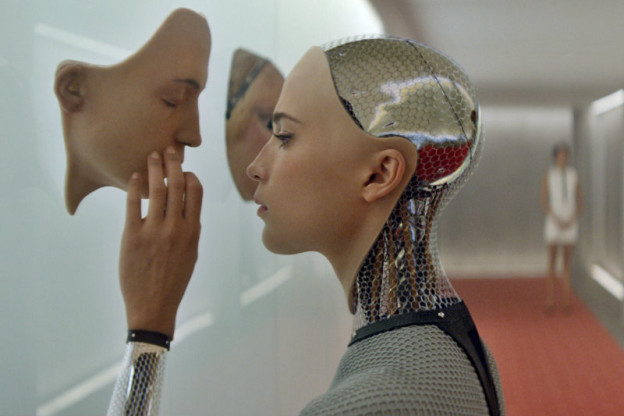By Robert Yaniz Jr.
Even the genre’s most well-versed fans would be hard-pressed to find a sci-fi film that doesn’t in some way, shape or form touch on the dangers of technology. Stanley Kubrick set the tone in 2001: A Space Odyssey with the malevolent H.A.L. 9000 way back in 1968, and the theme has carried through virtually (pun intended) every major science fiction film for nearly half a century. Whether it is manmade or from the stars above, technology will – according to the movies, at least – be humanity’s undoing. So when we meet Ava (Alicia Vikander), the fetching artificial intelligence at the center of Ex Machina, it’s understandable to be more than a little skeptical.
The directorial debut from screenwriter Alex Garland (Dredd, 28 Days Later
), the film follows Caleb (Domhnall Gleeson), a young programmer who has won a company-wide lottery for the rare opportunity to spend one week with Nathan (Oscar Isaac), his employer’s enigmatic founder. Shortly after arriving, Caleb discovers that he is there to conduct a thorough test of Nathan’s newest invention, the aforementioned A.I., and finds himself torn between Ava and her creator.
Caleb’s struggle to sort out the truth behind his visit as well as Nathan’s true intentions drives the majority of Ex Machina, but the film’s narrative is a whole lot more fascinating than that. All three of its core characters are multi-dimensional figures, and audiences will more than likely find their alliances shifting throughout the film. It’s the kind of moral complexity that films like this should really be striving for, as the line between humanity and their technology has continued to blur more and more with each passing year. It is the age of smart phones, after all.
Garland also makes the most of his modest $16 million budget by imbuing Ex Machina with a sense of isolation entirely befitting the tale at hand. Both Caleb and Ava are restricted in where they can go, and the limited number of sets lends itself to the tight quarters the characters are in and simultaneously allows Garland to focus his story on the emotional story at hand rather than the impressive visuals that are incidental to the story’s subject matter (it’s worth noting that the A.I. character design and pseudo-science described in the film is particularly well-crafted).
The interactions between Vikander and Gleeson are some of the most riveting interrogation scenes since The Silence of the Lambs, and Isaac – who has been turning in one strong performance after another for years, most notably as the lead in the Coen brothers’ Inside Llewyn Davis
– emerges as the MVP here. He carefully tows the delicate line between making Nathan just enough of a pompous jerk to make him suspicious but not enough to completely betray any sense of likability or sympathy that the audience may have for him. The acting is top-notch all across the board, and it’s clear that the cast has a firm grasp on the biting social commentary Garland aims to accomplish with the film.
Touching on an array of deep themes involving what makes us human, the influence sexuality has on our emotional decision-making and the ethics of playing god, Ex Machina is perhaps the first great piece of thought-provoking science fiction to come out of 2015 thus far. Garland and his three stars demonstrate here that – despite the success of their previous projects – they are all destined for even greater things, and seeing as both Gleeson and Isaac are already slated to share the screen in Star Wars: Episode VII – The Force Awakens later this year, that prophecy is already on the verge of coming to fruition.


